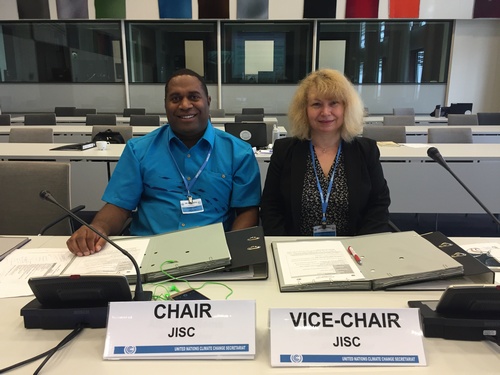In Focus
 JISC elects Chair and Vice-Chair for 2017
JISC elects Chair and Vice-Chair for 2017
Bonn, Germany, 19 May 2017 – The Joint Implementation Supervisory Committee (JISC) at its 40th meeting held on 19 May elected Mr. Albert Abel Williams, Member of Parliament, Vanuatu, and Ms. Gherghita Nicodim, Counselor at the Ministry of Environment, Romania, as Chair and Vice-Chair, respectively.
Mr. Williams takes over from Konrad Raeschke-Kessler, who remains a member, and Ms. Nicodim takes over from Mr. Albert Abel Williams. Both will serve in their executive capacities until the first meeting of the JISC in 2018.
The JISC adopted the two-year management plan 2018-2019 with the objectives of i) maintaining the infrastructure and capacity to ensure JI operations and ii) share the experiences gained and lessons learned to provide further information and recommendations for the development of rules to operationalize Article 6 of the Paris Agreement.
The JISC decided to continue allowing DOEs accredited under CDM to act voluntarily as AIEs under JI to perform determinations and verifications. The JISC noted that as on date eleven DOEs have submitted self-declarations, expressing their interest to act voluntarily as AIEs.
In the spirit of prudent management of resources, the JISC also decided to consult electronically with members for any decision making during the year.
Through the JI mechanism, a country with an emission reduction/limitation commitment under the Kyoto Protocol may take part in an emission reduction (or emission removal) project in any other country with a commitment under the Protocol, and count the resulting emission reduction/removal towards meeting its Kyoto target.
The second commitment period of the Protocol, agreed to by Parties, has yet to come into force. Thus, JI currently suffers from lack of demand and its future role is uncertain.
JI projects earn emission reduction units (ERUs), each equivalent to one tonne of CO2. ERUs are created through the conversion of an equivalent number of a country’s assigned amount units. All emission reductions must be real, measurable, verifiable and additional to what would have occurred without the project.
Under JI there are two “tracks” by which projects can apply for approval: Party verification and verification by an international independent body, the JISC. The JISC answers ultimately to the Parties that have ratified the Protocol.

Offset now: visit the United Nations Carbon Offset Platform
Connect with us: